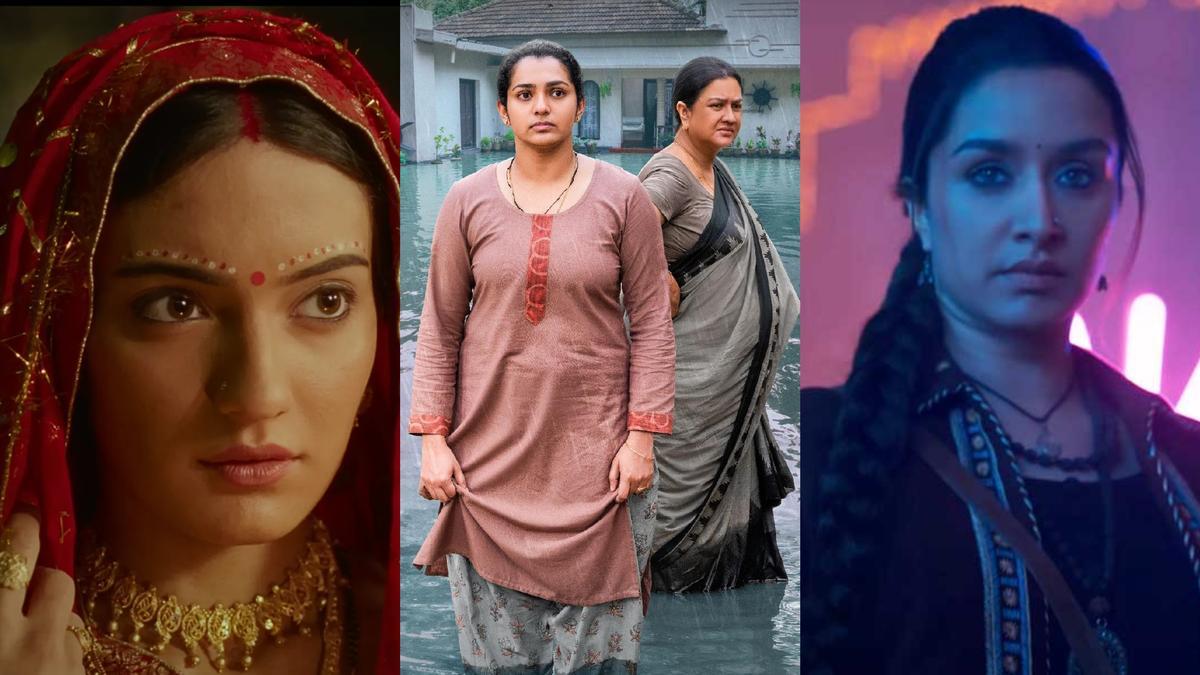
It has been an agonising August for Indian women. The country was rocked by two distressing incidents that underscore the continued struggle women face. In Kolkata, a medical student was brutally silenced, sparking an outcry and the poignant cry of “beti padhi par bachi nahin” (the daughter studied but could not survive). Meanwhile, a champion wrestler found herself the target of casual fat-shaming by a woman MP from the film industry, simply for missing her weight category by a mere 100 grams.
While these real-world tragedies weighed heavily on the nation’s conscience, the silver screen offered a glimmer of hope. August has proven fulfilling for women in film, portraying them with strength against injustice. The message of female empowerment was strong when the Malayalam drama “Aattam” (The Play) won at the National Awards. Directed by debutant Anand Ekarshi, the gripping narrative unveils how even seemingly safe and progressive spaces can turn hostile when women speak up about bodily violations. Set against the backdrop of theatre and cinema, the film strips away the veneer of gender sensitivity that some men wear according to their convenience.
This significant recognition came just days before the Kerala government finally released the Justice Hema Committee report, a long-overdue document, submitted four-and-a-half years ago. The report exposes the rampant harassment and discrimination faced by women in Mollywood, inflicted by a powerful lobby of male producers, directors, and actors. Despite the inordinate delay in making the report public, its release marks the first time a government in India has formally studied the specific issues faced by women in the film industry. The cases and concerns highlighted resonate across the nation, as Bollywood actors too have voiced their experiences of gender discrimination and the persisting menace of the casting couch, although these complaints are often swept under the rug.
Coinciding with the public examination of the Hema Committee report, Christo Tomy’s “Ullozhukku” (Undercurrent) was gaining acclaim on a streaming platform and at the Kerala State Awards. Set in an inundated village, where the floodwater symbolizes emotional turmoil, the film tenderly explores love and companionship. The narrative brilliantly challenges entrenched notions of morality and guilt, often imposed on women by men, through the allegory of a buried body. Starring Urvashi and Parvathy, “Ullozhukku” delves into the often-overlooked relationships between women in mainstream cinema.
. Tomy sensitively navigates the complex dynamics between a mother-in-law and her daughter-in-law after the link that connected them—a son and husband—succumbs to cancer. The film questions who truly controls a woman’s body before and after marriage, also shedding light on how sectarianism and patriarchy persist within Kerala’s Christian community.
Furthering the discourse on female bonds on screen, Kiran Rao’s “Laapataa Ladies” was recently showcased to Supreme Court judges. Like “Ullozhukku,” this film too critiques rigid societal norms imposed on women, albeit with a lighter touch. Through its narrative, “Laapataa Ladies” peels back the layers of an unjust society and highlights the invisibility of women under entrenched patriarchy. The character Jaya, determined and resolute, finds a sliver of escape from tradition’s stranglehold, while the innocent Phool is trapped within a patriarchal culture. Left behind on a train platform, Phool hides behind a large dustbin marked ‘use me,’ symbolizing societal disposal of women.
In a different narrative thread, Nithilan Swaminathan’s “Maharaja” also utilizes the metaphor of a dustbin, where a father describes his missing daughter in a police station. The search for his daughter reveals systemic patriarchy and corruption. Both “Laapataa Ladies” and “Maharaja” depict the police station as a more daunting place than being robbed, where protagonists must often bribe officers to find justice.
Amid these varied depictions of female struggle and resilience, Nikkhil Advani’s “Vedaa” introduces a Dalit girl who defies the self-appointed guardians of caste and morality. Although aided by male saviors, her courage feels genuine and deeply moving.
In stark contrast to the humans disguised as monsters, Amar Kaushik’s sharp satire “Stree 2” portrays supernatural demons rising to uphold patriarchy, targeting women who dare to be progressive in education, love, and personal choices. A memorable scene features Pankaj Tripathi explaining, in pure Hindi, that the length of a woman’s braid does not determine her worth, despite societal prejudices. The line harks back to a famous socialist leader’s derogatory comment about short-haired women during debates over the Women’s Reservation Bill in 1997.
In conclusion, Indian cinema this August has provided a powerful platform for voicing women’s issues, offering narratives rich in resilience and defiance. These stories of struggle and triumph echo the realities faced by women across the nation, driving home the message that the fight for gender justice is far from over but is steadfastly gaining ground.












